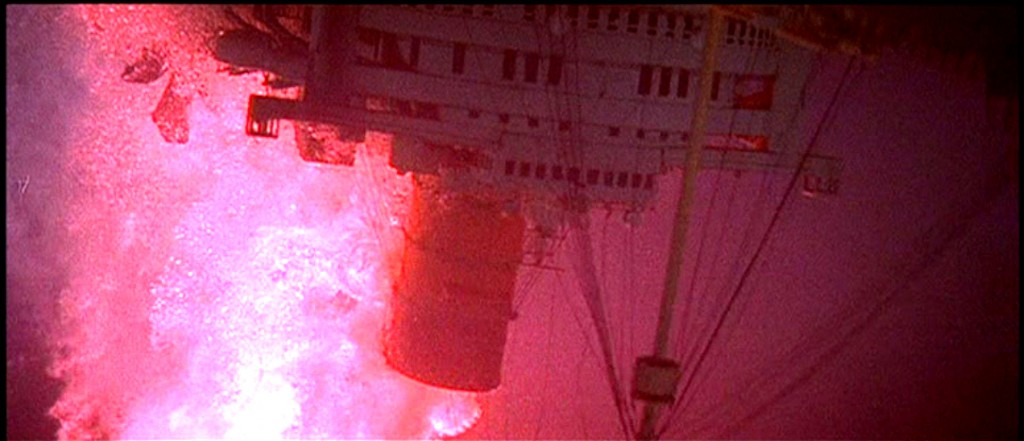Favorite screenplays: The Poseidon Adventure part 4
Once The Poseidon Adventure metaphor turns literal, the movie becomes largely about problem-solving and group dynamics. The Rebel Priest leads, The Cop keeps order, The Lonely Man has ideas and watches out for The Waif, The Girl moons over The Rebel Priest, The Boy knows everything, The Elderly Jewish Couple kvetches, The Whore bitches, The Waiter falls to his death.
A little past the half-way point, the group meets another group of passengers, this one being led by the ship’s doctor (another authority figure). The doctor is leading his team, much larger than our group, to the bow of the ship. He’s walking them downhill, which would seem to be a mistake on a sinking ship, but he’s confident that that is the way out.
And so the narrative pivots — do we follow the doctor, who knows the ship, or Scott, who is more sure of himself? Rogo, his cop instincts kicking in, argues in favor of going with the herd, while Scott argues that that cannot be right precisely because that’s what everyone else is doing. Mr. Martin steps in between them and begs them to stop shouting — it’s making everyone else upset. Either Scott is right to buck the trend, or Rogo is right to follow it, or both are right and everyone will be fine, or neither is right and they’ll all end up dead, but Mr. Martin is more concerned with everyone’s mental health in the meantime. Which, again, is a tidy summation of politics in America. Right, wrong, who knows, the leader’s job is to inspire confidence, not to argue with his opposition.
Susan underscores the point when she follows Scott to the stern. She had been ordered to stay behind, but she “feels safer” with Scott. And so Scott is reminded that his job isn’t merely to lead, it is also to comfort. The Chaplain made the choice to comfort back in the ballroom, and while he may be dead now, he at least was humble enough to understand his role — Rev Scott is so intent on leading, he’s bound to eventually leave everyone on their own.
(It’s worth mentioning that, in the novel, the doctor and his flock of doomed passengers get out just fine.)
During this second-act interlude, Mr. Martin and Nonnie have a private moment in an upside-down barber shop. Nonnie, insipid in her best moments, becomes almost catatonic when she remembers her dead brother. I mention this only because Nonnie ends up living, but in the 2006 remake, Poseidon, the Nonnie correlative suffers a head wound and drowns or gets electrocuted or something (it’s unclear). In 1972, The Waif is safely ushered to the light, in 2006 she’s left dead in a stairwell without a second glance.
Rev Scott finds the engine room, but it’s accessible only through 35 feet of water. Mrs Rosen argues that she’s the best swimmer in the group, but Rev Scott must lead, because that is what he does. He pays for his arrogance when he gets trapped under a Big Metal Thing, then pays doubly when Mrs Rosen dies while getting him out.
Mrs Rosen’s death becomes the emotional high-point of the narrative. The Rebel Priest is brought face to face with his choices — he demands the individual’s responsibility for his or her self, and Mrs Rosen believes herself to be part of a continuity. “I got trapped, Mrs Rosen freed me,” says Scott, meaning that he was trapped in his worldview of rebellion above all, and Mrs Rosen freed him of his ego, reminded him of his responsibility to others. I’m sure it means something that Mrs Rosen is a Jew and Scott is a Christian.
Rogo, seeing Mrs Rosen’s sacrifice, suddenly sees the light — he’s now a devoted follower. He pays for his sudden conversion with his wife’s life — she falls to her death minutes later. His wife, don’t forget, is the only meaningful thing in his life — what has he got to go on for now?
Scott, seeing his most important convert shattered, finally offers himself as a sacrifice to the God he once railed against. (There’s some business with a steam valve to give the moment practical use — in the novel, Scott merely dives into a lake of fire and drowns himself.)
And so the rest are rescued, through a combination of spirituality, craft, decency, spunk, and the suppression of ego. Or, you could say that Scott’s sacrifice is a supreme ego trip — he sees himself as Jesus, and his disciples’ survival proves his divinity. Is it still rebellion if you sacrifice yourself to the father you hate?

Could the Mrs. Rosen being a Jew and dying for Scott’s sin of pride be Christ image? Or were you being sarcastic? Damn you, Alcott!
I’m honestly not sure. I don’t think it’s a literal thing, like “the Jew dies, making clear the goal of Christianity” or anything.
Huh. That’s kind of how I took it. Like he’s seeing the crucifixion up close and it reignites his faith. Then the steam thingy happens and it’s the ultimate test of his faith.
But, more importantly, reading these analyses made me watch Poseidon for the first time (I’d always thought of it as just another disaster movie), and I loved it, so thank you!
I’m not sure how I feel about the steam valve. The screenwriter in me approves of it because it’s a little more practical, but in the book it’s just Scott killing himself. The first makes better movie sense, the latter makes more dramatic sense.
How about the flaming water he drops into being a baptism by fire?
I’m going to say the lake of fire is Hell.